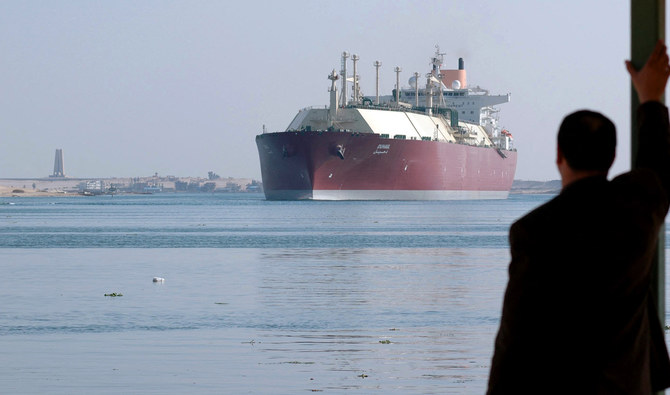KARACHI: Pakistan is bracing for one of the harshest winters this year following skyrocketing prices of Liquefied Natural Gas (LNG) spot cargoes in the global market and record currency depreciation at home, analysts said, as fears of increasing gas outages during peak winter hours loom large.
The south Asian country requires 4.1 billion cubic feet per day (bcfd) of gas, with winter demand peaking to around 4.5 bcfd against local production of 3.22 bcfd. The shortfall is bridged through LNG imports.
Seen as the viable option to meet domestic gas demand, Pakistan started importing LNG seven years ago. However, the price of the commodity in the international market surged from lows of $2 per million British thermal units (mmBtu) in 2020 to highs of $57 in August this year after demand in Europe surged, pushing Islamabad out of the spot market for the time being.
At present the country only relies on imported LNG cargoes through long term contracts made with Qatar and Italian multinational ENI. The term agreements allow the country to import around 8 cargoes per month against the requirement of around 12 to meet the shortfall.
An official from Pakistan LNG Limited (PLL), a state-owned entity mandated to import and procure LNG, confirmed to Arab News on Tuesday that the country was currently importing all term cargoes from Qatar and ENI.
As the spot LNG market remains out of the reach of Pakistan, many Pakistani analysts expect the current winter season to be tough for domestic gas consumers amid shortages of gas.
Pakistan imported its last LNG cargo from Qatar at $17 per mmBtu under a long-term supply agreement.
“Normally the demand in winter increases by around 1 bcfd,” Farhan Mahmood, Head of Research at Sherman Securities, told Arab News. “As this year Pakistan is unlikely to secure cargoes from spot market, it is expected that shortfall and load shedding of gas will be more than last year.”
“With LNG prices currently hovering around $38 per mmBtu and the Pakistani rupee trading at historic lows amid depleting forex reserves, the government may not venture to import costly gas, rather it would prefer to save dollars.”
PLL did not receive any bid in response to a tender floated in July 2022 to import 10 cargoes of LNG
Pakistan’s woes were also compounded after Russia invaded Ukraine early this year and European countries rushed to secure gas supplies from LNG producing countries as Moscow slowed gas flows westwards.
The Kremlin says the West triggered the energy crisis by imposing the most severe sanctions in modern history, a step President Vladimir Putin says is akin to a declaration of economic war
“The Russia-Ukraine war has also disrupted the international market and European countries have rushed to secure cargoes for winter as demand has increased substantially there,” Mahmood added.
Some experts, however, say gas outages would be comparatively on the lower side this winter as high demand for gas will be compensated with additional electricity generation.
“By December this year some 1320MW electricity would be added to the national grid with commissioning of three coal-fired power plants in Thar, Sindh, that would compensate the gas demand,” Tahir Abbas, Head of Research at Arif Habib Limited, a Karachi-based brokerage firm, told Arab News.
“There would definitely be a shortfall of gas but it would not be as severe as it was last year keeping in view the additional electricity generation.”
Pakistan’s policy in winters is to divert gas supplies to domestic consumers from the power sector, which in turn impacts industrial activities.
This year, the government is also expected to encourage consumers to switch over to electricity by offering incentives to save gas for industrial and heating purposes.
In another bid to secure long-term supplies of gas, PLL has invited bids for 72 LNG cargoes from international suppliers across a period of six years. The fate of the tender would be decided on October 03, 2022, when the bids are opened.
The south Asian nation’s import of LNG declined by 3.37 percent to $629.4 million during the first two months, July-August 2022, of the current fiscal year, compared with the same period last year.
Pakistan energy imports increased by 105.3 percent to $23.3 billion during the last fiscal year, FY22, including the imports of LNG which increased by 90.6 percent to $4.98 billion, according to official data.















